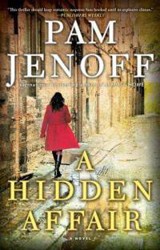It is always pleasant to read an author who can take you back to the past with minute details that cause you to revive faded memories. Sande Boritz Berger does this for Americans who lived during the 1940s by recalling items such as the monthly magazine Modern Screen, one of the first journals to record the private lives of movie stars, mascara which came in cake form and had to be applied with a wet brush, and cut glass doorknobs. She uses these touches to set the scene for life in a residential middle class section of Brooklyn as well as for contrast of the superficial lives of Americans who were untouched (or thought they were) by World War II and those who terrifyingly lived through it in Poland.
Berger tells the story of two girls, Mira, a teen living in a large house on Avenue T in Brooklyn and Rosha, a ten-year-old, living in the basement of a stranger’s house in Poland. These two are cousins who have never met. And the suspense leading up to when their lives will intersect is kept up throughout the book.
The description of Mira’s thoughts and activities in the ‘40s is precise and alive. Her relationships to her parents, her brother, her best friend, Faye, and household help are portrayed in such a way, it is almost like a memoir. Her love-hate relationship with her father as she works for him at Kane Knitting (Kane changed from Kaminsky), and gradually gains some control at work, is relayed almost autobiographically. And her jealousy of her best friend, Faye, who goes off to Hollywood to become a fashion designer which is what Mira wanted to do before her father enveloped her in his factory, has a truthful quality.
Simultaneously, Rosha’s story of a girl whose father thrust her into the arms of a non-Jewish woman, known as Mrs. Juraska, a candle-maker and begged her to take care of his daughter as he was in the midst of a roundup of Jews being taken to a concentration camp, is told. But Rosha’s feelings about being thrown into a strange home so suddenly without saying goodbye to her parents does not have the emotional impact of the Brooklyn story.
Apart from depicting the behavioral characteristics of Rosha, who refuses to eat or talk during her first month living in the basement of this family’s home, little is given about her inner struggle. Is she angry at her father? Is she curious about the whereabouts of her beloved “Bubbe?” Is she tortured by memories of her pleasant former life with her family? We are not privileged to know. We are left to assume these things. And Rosha remains optimistic in the face of the mean teasings of Victor, a young boy in the Juraska household who hates her entry into his life as it takes his father’s attention away from him, and in the dreariness of her solitary life in a cold basement.
She spends her time making up scenarios to playact with the young daughter of the household when Sophie is allowed to visit or imagining her welcome in America when she finally will meet her cousin, Mira.
The book ends when Rosha arrives in America and her arrival helps to heal all the various sufferings and conflicts her American relatives were undergoing. The love they feel for her unites them. And so the two stories end happily.





